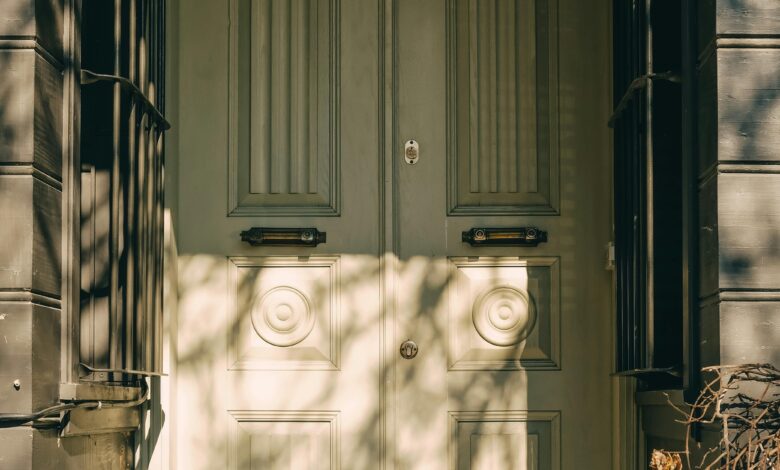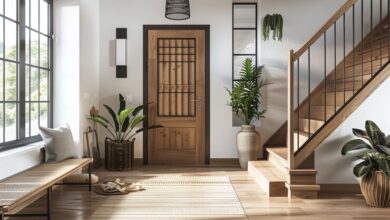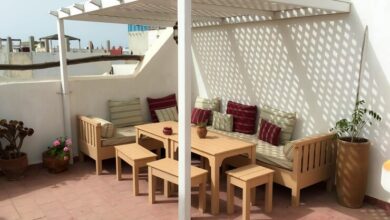Triple vs Double Glazing for Bifold Doors

Triple vs Double Glazing for Bifold Doors, An additional layer of thermal insulation from triple glazing increases energy efficiency and lowers external noise. Homes in places with high levels of noise pollution or colder temperatures may find this to be very helpful. In contrast, double glazing is more affordable while still providing noticeably better soundproofing and insulation than single pane.
Additionally, it lets in more natural light into the room. The choice between triple and double glazing will ultimately come down to your financial situation and individual requirements. Triple glazing might be a better option if energy efficiency and noise reduction are your top concerns.
Advantages of double glazing vs. triple glazing Doors
Block Out Noise From Outside:
Both triple glazing and double glazing are good options for bifold doors to block out external noise. However, there are some important differences between the two that you should consider. Triple glazing provides the highest level of sound insulation as it has an extra layer of glass, which makes it more effective at reducing noise transmission. The additional glass layer creates a stronger barrier against sound waves, resulting in a quieter and more peaceful indoor environment. On the other hand, double glazing also provides satisfactory sound insulation, but it may not be as efficient as triple glazing. Choosing between the two depends on the level of noise pollution in the surrounding area. If the noise is constant or very bothersome, triple glazing is likely to be the better option. However, if the noise is minimal or easily manageable, then double glazing should suffice.
Improved Energy Efficiency:
When deciding between triple and double glazing for bifold doors, it’s important to consider energy efficiency. Triple glazing provides superior insulation due to an extra pane of glass, which adds an extra layer of protection against heat transfer. This can significantly reduce heat loss during colder months, leading to a more energy-efficient home and lower heating bills. Double glazing, on the other hand, consists of two glass layers with a layer of air or gas in between, which still provides substantial insulation benefits but may not match the same level of thermal efficiency as triple glazing. The choice between triple and double glazing depends on factors such as the climate, local building regulations, and budget. While triple glazing may provide exceptional energy efficiency, double glazing may still be an excellent option for bifold doors, especially in areas with milder climates. It’s important to carefully assess these factors and consult with experts to make an informed decision that best suits your specific requirements.
Enhanced Security:
When deciding whether to install triple or double glazing for bifold doors, security should be a crucial factor to consider. Triple glazing offers superior security benefits when compared to double glazing. With an additional pane of glass, triple glazing provides an extra layer of protection against intruders, making it more difficult for them to break in. The thickness and weight of triple glazing also make it more resistant to forced entry attempts. Moreover, triple glazing can enhance the door system’s overall strength and rigidity, discouraging unauthorized access. This added security feature provides homeowners with peace of mind, knowing that their property is well protected. Although double glazing also provides some level of security, the extra level of protection offered by triple glazing makes it the preferred choice for those who prioritize the safety and security of their homes.
Less Condensation:
Triple glazing offers a significant advantage over double glazing for bifold doors as it can greatly reduce condensation. Condensation is caused when warm, moist air comes into contact with a cold surface, creating water droplets. While double glazing can help to minimize condensation by providing an additional layer of insulation, keeping the inner pane warmer, triple glazing takes this insulation to the next level by adding a third pane of glass, creating an extra barrier against outside temperatures. This improved thermal performance helps to maintain a more consistent temperature inside the property, reducing the occurrence of condensation on the inside of the glass. By using triple glazing for bifold doors, homeowners can enjoy clearer views and a drier indoor environment while benefiting from enhanced energy efficiency and sound insulation.
Costs:
When deciding between triple and double glazing for bifold doors, homeowners need to consider several factors, especially the costs involved. Triple glazing is undoubtedly more efficient at thermal insulation, which leads to potential savings on heating bills in the long run. However, triple glazing is generally more expensive compared to double glazing due to the additional glass pane and extra materials required. Double glazing, on the other hand, still provides a significant improvement in insulation compared to single glazing and is more affordable in terms of upfront expenses. Therefore, homeowners should consider their budget, the specific climate they live in, and their long-term energy-saving goals when deciding between triple and double glazing for bifold doors. While triple glazing can offer better insulation, the cost factor should be carefully weighed against the potential energy savings to make an informed decision.
The Weight:
The weight of the glazing must be taken into account when choosing bifold doors because it has an impact on the doors’ functioning and performance. Compared to double glazing, which has two panes and one air gap, triple glazing is heavier because it contains three glass panes with two air gaps. Installing and operating bifold doors with triple glazing can pose challenges, especially with larger door systems. On the other hand, double glazing is lighter and easier to handle, but may not offer the same level of insulation as triple glazing. Therefore, it is crucial to find a balance between weight and performance when choosing the glazing option for bifold doors. This balance ensures that the doors are strong enough to withstand daily use while providing optimal thermal efficiency.
Durability:
The durability of bi-fold doors should be taken into account while making your selection. Whether triple or double glazing is utilized, it can make a big difference in how strong and durable they are. Triple glazing is more durable than double glazing because it has three layers of glass and two insulating air gaps.
The extra layer of glass not only enhances the door’s overall strength but also increases its resistance to potential damage caused by external factors such as extreme weather conditions and accidental impacts. This robustness translates into a longer lifespan for the doors, reducing the need for frequent maintenance or replacement. Additionally, triple glazing is known for its excellent noise reduction qualities, ensuring a quieter and more peaceful environment inside the house. While double glazing can still offer satisfactory durability, especially when using high-quality materials, triple glazing takes it to the next level, making it a wise choice for homeowners seeking long-lasting and sturdy bifold doors.
Potential For Higher Resale Value:
Triple glazing is a better option for bifold doors if you want to increase their resale value. Triple glazing consists of three panes of glass with two air gaps between them, while double glazing has two panes with one air gap. Triple glazing provides superior thermal insulation and soundproofing than double glazing. This insulation can lead to reduced energy consumption and lower utility bills, which is a desirable feature for potential buyers. Moreover, the better soundproofing creates a more peaceful and comfortable living environment. As homebuyers are becoming more aware of the benefits of energy efficiency and noise reduction, they are willing to pay more for properties that offer these features. Therefore, choosing triple glazing for bifold doors can significantly increase the resale value of the property, making it more attractive to buyers looking for a modern, energy-efficient, and peaceful living space.
FAQS:
Does triple glazing require a larger frame size for bifold doors?
A slightly wider frame is typically needed for triple glazing to fit the additional glass pane and insulation layers. Though smaller profiles are now possible because of technological developments, there might not be much of a visual distinction between triple-glazing and double-glazing frames.
Can I upgrade from double glazing to triple glazing on existing bifold doors?
On current bifold doors, it is possible to convert from double glazing to triple glass, although the glazing unit may need to be replaced as a whole. To determine if such an improvement is feasible and cost-effective, speaking with a window expert or installer is advised.
Can I mix triple-glazing and double-glazing within the same bifold door system?
With the same bifold door technology, triple glazing and double glazing can be combined. This can be helpful if you want to reduce noise or enhance insulation in some portions of the door while keeping other areas of the door as inexpensive as possible.
Are there any drawbacks to using triple glazing for bifold doors?
Although triple glazing provides excellent soundproofing and insulation, there are a few things to keep in mind. Since triple glazing is typically heavier than double glazing, more durable gear may be needed to ensure smooth functioning. Furthermore, the bifold door system’s overall weight capacity and structural requirements may be impacted by the glazing’s increased weight.
Does the choice between triple glazing and double glazing affect the aesthetics of bifold doors?
Choosing between double and triple glazing has little bearing on how attractive bifold doors are. Both glazing choices can be made to seem sleek and contemporary with thin profiles.



